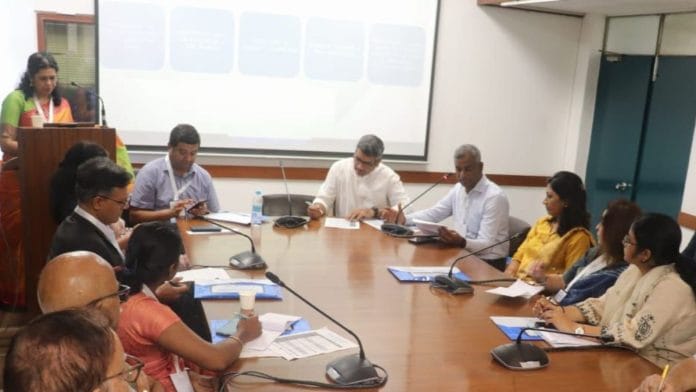New Delhi: India is ageing. And the dreaded D-word is becoming a household worry. Tackling dementia is a challenge, especially in a culture where the practice of institutional care for the elderly isn’t the norm.
“India is an ageing-at-home country, and the goal isn’t more institutions—it’s keeping people out of them. That means focusing on prevention, long-term care, and strengthening support at home,” said Asheesh Gupta, founder and CEO, Samarth Elder-Care, at New Delhi’s India International Centre.
He was part of a panel at the National Consultative Meet on Dementia Strategy, organised by The Institute of Human Behaviour and Allied Sciences and Dementia India Alliance (DIA). The National Human Rights Commission and the National Institute of Social Defence also collaborated on the event.
The panel also featured Jayashree Dasgupta, co-founder of Samvedna Senior Care, Renu Vohra, Member Secretary at Alzheimer’s and Related Disorders Society of India (ARDSI), Pavitra Gangadharan and S Premkumar Raja, co-founders of DIA; and Anshu Verma, AGM, Healthcare Sector Skill Council. It was moderated by Sridhar Vaitheswaran, co-founder, Dementia India Alliance.
One of the discussions, titled ‘Supporting Caregivers and Strengthening Systems’, consisted of voices from the ground—caregivers, clinical psychologists, healthcare planners, and training experts. They stressed that while medical solutions are still in the evolution phase, care remains the foundation.
“The real opportunity lies in upgrading those already involved—family members, attendants, community health workers. They don’t all need degrees; with the right guidance, they can make a real difference. We don’t need to reinvent the wheel—just demystify care and scale what already works,” Gupta said.
Training, certification, career pathways
Over 8 million Indians are currently living with dementia. But caregiving for the disorder is neither well-paid nor respected. That must change if it has to become a lasting profession.
“A person joins as a care worker, and that’s where they are stuck for most of their life. There needs to be a structure that gives them hope that they can rise through the ranks. Whether that’s through additional training, certification, or leadership roles, it must be made possible,” said Vaitheswaran.
According to Raja, the answer is in simplifying licensing, offering land at concessional rates to caregiving facilities, and creating a structured career pathway.
“We need to build an ecosystem that supports caregiving services through public-private partnerships. We need to provide subsidies and training support to service providers who are actually doing the work on the ground,” he said.
The human cost of the broken system is already visible. Gangadharan, who runs residential care services, noticed that young people come out of short government-run courses thinking they are ready. But when they realise what caregiving actually looks like—changing a diaper, feeding someone who can’t speak—they tend to back pedal.
“We don’t have systems for reinforcement or ongoing support. We need long-term, practical, and emotionally intelligent training—not just theory,” she said.
India lacks a consistent, nationwide approach to dementia care training. This would include not just structured course content, but also ensuring that the training institutions, assessment methods, and certification processes meet common standards and align with the National Credit Framework.
Many caregivers acquire skills on the job, but lack a formal credential to show for it. Verma urged that such skills be validated rather than forcing individuals to start from zero.
Also read: Release Wangchuk, probe 24 September police firing: Kargil-based group
Ecosystem and policy
While dementia awareness is vital, the panellists stressed that recognising and supporting informal carers is equally urgent.
“Thousands are caring for people with dementia without any official training,” Verma said. “They’ve learned everything by observing, doing, and being present. Forcing them to start from scratch is unfair.”
She called for a robust Recognition of Prior Learning (RPL) system to formally validate the skills of informal carers, along with the creation of a national caregiver registry—much like those for doctors or nurses. “A registry brings transparency and safety for both caregivers and employers, while giving caregivers a sense of professional identity and pride,” she added.
Verma also highlighted the lack of safeguards for caregivers. She mentioned a caregiver who had asked her on a field visit how she was supposed to stay safe: “I am certified, but how do I know if the person I care for has HIV, TB, or pneumonia? Who’s protecting me when I go home to my kids?”
The picture is changing, however. Community-based models are already filling critical gaps. Vohra explained how ARDSI conducts outreach in senior groups, schools, and resident welfare associations. Once families understand dementia, they reach out to ARDSI’s helpline and are then guided toward diagnosis at hospitals like AIIMS.
And diagnosis is just the beginning.
“Most families come to us when the condition is already advanced. That’s when our real work begins—counselling, linking them to care centres, and supporting them long-term,” Vohra said.
With only 20 ARDSI chapters across the country, she stressed the need for government intervention, particularly to support rural areas where services are scarce.
(Edited by Prasanna Bachchhav)






